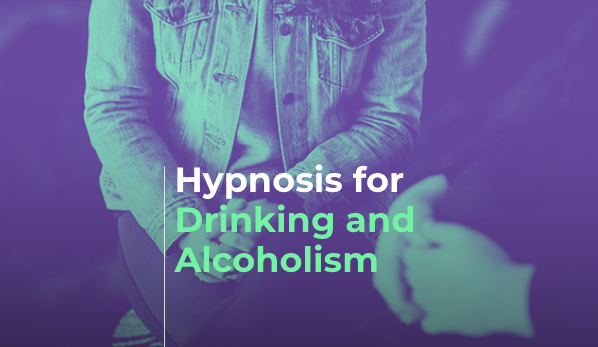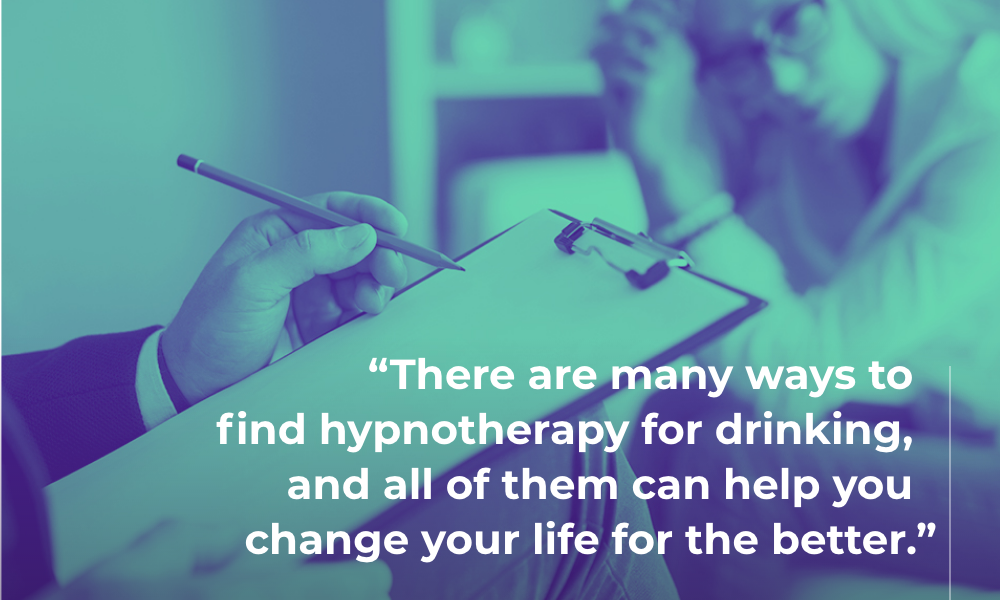Can hypnosis help reduce drinking? The answer for many is yes!
Maybe you feel that alcohol is something you can’t function without. Or, maybe you have a problem quitting drinking once you’ve started. Maybe you want to be completely alcohol-free. Or, maybe you only drink casually and want to ensure you never have too many. Regardless of what your relationship with alcohol may be, hypnosis can help you set limits on your drinking.
As a disclaimer, this article isn’t meant to treat or diagnose any medical conditions. If you believe you have an addiction to alcohol, please see a medical professional for a full diagnosis. This article is simply meant to offer information on an alternative way to change behaviors.
If you or someone you love is struggling with an alcohol problem, hypnosis can help. Hypnosis can help you improve all aspects of your life, including helping you manage your alcohol consumption. Unlike other programs, hypnosis doesn’t require total abstinence or weeks of support therapy. Instead, hypnosis is a natural and easy way to reduce your alcohol consumption or quit drinking altogether. If you’ve tried other solutions but were disappointed with the results, you’ve come to the right place. Keep reading to learn how hypnotherapy can help you manage your alcohol consumption.
How Does Hypnosis for Alcohol Abuse Work?
Hypnosis for alcohol change works just like all other types of hypnosis: by slowing down your brainwaves and communicating with your unconscious mind.
When you’re in a hypnotic trance, your brainwaves are in Theta Frequency. This is the frequency that hovers just above sleep. It’s why people in hypnosis look like they’re asleep, but in reality, they’re aware of everything around them.
If you’ve ever had a great idea right before you fall asleep, it’s because your mind was passing through that creative state called Theta Frequency. Hypnotists often use creative visualizations, like thoughts, images, and emotions, to communicate with your mind while it’s in Theta.
But just what are they communicating with?
Whether you call it your unconscious or subconscious mind, it’s the part of your mind that stores your memories, habits, and beliefs about the world. If you’ve ever done something without thinking about it—like driving a car or brushing your teeth—it was your unconscious mind that did the task.
Once in Theta, the hypnotist delivers hypnotic suggestions to your unconscious mind. These suggestions positively change your habits and beliefs, and they can be tailored to any situation—including drinking alcohol.
Hypnotherapy Techniques to Stop Drinking
Hypnotherapy has a long-standing history of helping people overcome various bad habits. Maybe you’ve heard of hypnosis to stop smoking, or hypnosis to eat better. Just like those other hypnosis types, hypnosis to quit drinking is about altering habits and beliefs. There are quite a few ways hypnotherapists can help you with your alcohol problem. Here are some of the most common alcohol hypnotherapy techniques:
Aversion Therapy
Traditionally, hypnotherapy used aversion therapy to help people quit drinking. With this type of hypnosis, a hypnotherapist would help you avoid drinking by making you feel ill every time you drink.
Aversion therapy is a time-tested practice in many areas of mental health. It simply links the action you want to change with a negative feeling. An example of aversion therapy to stop drinking could be placing a chemical in each drink to induce nausea.
While aversion therapy is effective, it can be quite drastic. It’s not the best route for everyone, and it’s not the only option hypnosis has to help you stop drinking. Hypnosis is all about helping your mind make new connections. It can help you link the old behavior (drinking) with a new response (avoiding it) without the discomfort of traditional aversion therapy.
Alcohol Protocols
Another way hypnotherapy can help you reduce or stop your alcohol consumption is with alcohol protocols. Protocols are hypnosis programs that have been time-tested by hypnotists around the world. These frameworks lay out specific points in an order that helps a hypnotist get you the results you’re looking for.
These protocols are scripted enough to give you great results, and flexible enough to tailor them to your life.
Hypnotists have created many protocols that can aid you with your drinking problem. Some protocol methods focus on the underlying emotions that cause you to drink. Many people use alcohol to numb emotions that they don’t want to feel.
Hypnosis can help manage those difficult emotions in a healthier way. With these protocol methods, the hypnotist dives into memories dealing with the root cause of the problem.
However, hypnosis for drinking protocols don’t have to dive back into a traumatic memory to overcome it. Some protocols simply help you associate drinking with a negative response. And some hypnotists even teach their clients self-hypnosis protocols to help prevent a relapse.
A 2004 study with veterans fighting alcohol abuse showed that self-hypnosis techniques helped them fight the urge to drink. Those who used self-hypnosis reported, “…the highest levels of self-esteem and serenity, and the least anger/impulsivity, in comparison to the minimal-practice and control groups.”
New Responses to Old Anchors
For many, drinking is simply a habit. You come home, and it’s five o’clock. Your mind thinks, “This is when we normally have a drink,” and you find yourself making one—whether you really want it or not. But hypnosis can help by providing your mind with new responses to old anchors.
Anchors are events, places, or people that trigger you to act a certain way. For example, we have anchors around starting a vehicle: We get in, put on the seatbelt, turn the key, and check for obstacles before entering traffic. If you’ve been driving a long time, you may do these things automatically without even thinking about them.
Anchors are so ingrained that they cause behaviors to happen on an unconscious level. In other words, you do them without thinking about them. If you have a problem with drinking, you have likely linked drinking to specific anchors. Maybe every time you see a particular friend or visit a certain part of town, you feel the urge to drink. Hypnosis to stop drinking can help by changing your response to those anchors in your life.
Hypnosis can help you swap out negative responses to anchors with positive ones. Seeing that friend or being in that part of town still triggers a response, but it’s a response that you choose. Or if you always crack open a cold one every time you get home from work, hypnosis can build a better habit that still helps you relax.
Anchors can also be emotions, like feeling bored or lonely. Hypnotists can create new responses to these anchors as well. It is all about changing your habits.
A Desire to Change
This is a technique that doesn’t come from the hypnotherapist’s toolbox. This one must happen inside of you. Hypnosis is a powerful tool to enact change in your life, but hypnosis cannot change you if you’re not ready to change. A hypnotist can provide you with new anchors and positive suggestions, but if you aren’t fully committed to making that change in your life, the change won’t happen.
You have to own the fact that you want to change. Otherwise, you’ll unconsciously work around the hypnotic suggestions, finding loopholes that allow you to drink to excess.
Ask yourself, Who really wants this change? If it’s from your friends, family, or therapist, you’ll have a hard time sticking to your goal. But if it’s who you really want to be, then hypnosis can help you unlock this new version of yourself.
Alcohol Consumption Goals: Reduce Alcohol or Alcohol-Free?

Hypnotherapy for drinking is very flexible. Most hypnotists will tailor a program for the outcome you want to achieve. Let’s look at the benefits of both reducing alcohol, or becoming alcohol free.
Decreasing Alcohol Consumption
Maybe you don’t want to give up drinking entirely, but rather you want to stop binge drinking. Maybe you have a problem drinking to excess, or you drink out of habit. Hypnosis can help you reduce your alcohol consumption. It won’t force you to go cold-turkey, but you’ll learn how to alter your drinking habits, so they’re not negatively impacting your life.
Here are some of the benefits of setting limits on your drinking:
- You can satiate your urges. Because you’re not cutting out alcohol completely, you can satiate your urge to drink. This can help you find a balance between wanting a drink and staying sober.
- You can’t “Fall Off the Wagon.” One drink won’t completely break your streak of alcohol-free days. If you have a drink, you’re not beating yourself up about it.
- You can still go out with your friends. You can still meet your friends or family members for a drink every now and then. Often, this helps you maintain your mental health by finding a balance between drinking and socializing.
Stopping Alcohol Consumption
Of course, if you want to completely cut alcohol out of your life, hypnosis can help you there as well. Going this route has several benefits:
- Your boundaries are clear. You know exactly what defines success. And if you fall off, you know exactly when you need to get back on track.
- You change at the identity level. You become someone who doesn’t drink anymore. Taking on this new identity can rapidly change your behaviors.
- You can stand up to peer pressure. If you don’t drink at all, it’s hard for someone to pressure you into having a third beer. Setting that clear boundary helps you stand up to outside influence.
Whichever route you decide to use, hypnotherapy sessions can help you change your drinking habits for the better.
Where To Find Alcohol Hypnotherapy
There are many ways to find hypnotherapy for drinking, and all of them can help you change your life for the better.
One excellent option is to use a hypnosis app, like Primed Mind. Primed Mind uses hypnosis audios created by professional hypnotherapists and offers a specific Primer for reducing alcohol consumption called, “Reduce Alcohol”. The audio helps you identify why you want to change, and the benefits you would receive from changing your drinking habits. It also helps you realize your drinking triggers and what you can replace those triggers with.
Pre-recorded audio tracks are great because you can use them anytime, anywhere. If you feel the urge to drink around a specific time of day or in a specific location, the app is a great resource that’s always with you. Of course, you don’t have to listen to hypnosis on the go. By putting you into a relaxed state of hypnosis in the comfort of your own home, the app can help you make amazing changes very quickly.
You can also see a hypnotist for one-on-one sessions. These hypnosis sessions may be much more expensive than using a hypnosis app. However, a hypnotist can tailor their subliminal messages to fit your exact idea of wellness.
Finally, you can learn to do self-hypnosis. Self-hypnosis techniques can help you overcome cravings the moment they happen. With tools like neuro-linguistic programming (NLP), there are even techniques you can do without finding a quiet room to close your eyes.
If you’d like to learn more about hypnosis audio tracks and how they can help you change your life, you can find them here.
What Are the Risks?
Most people experience no side effects from hypnosis. It’s a very safe form of treatment, often compared to guided meditations. In hypnosis, you’re simply receiving suggestions for a better life.
There are a handful of people who experience dizziness, fatigue, or nausea from a hypnotic state. If you’re concerned, talk with your doctor before your session.
As with any effective treatment for heavy drinking, you should consult with your doctor before going cold-turkey. Alcohol can form dependencies in your brain and body that can have severely negative consequences if you go off it too quickly.
Clinical hypnosis can help you get to where you want to be in life. As you alter your habits, remember that it doesn’t have to be an immediate, all-or-nothing change. If you have concerns, speak with your hypnotherapist before the session.
Are You Ready to Make a Positive Change?
You don’t need to hit rock bottom before you make a change. Whenever you’re ready to make a positive change in your life, hypnosis can help you get there.
Hypnotherapy is a non-invasive and effective treatment for reducing drinking. Also, it’s very affordable —especially when you use Primed Mind.
Hypnotherapy can help you reduce your alcohol consumption quickly. While many hypnotists and hypnosis audios recommend multiple sessions, you may see results after your very first one.
Most importantly, hypnosis should give you hope. It’s an all-natural, alternative treatment that can help you improve your relationship with alcohol, no matter how big its role in your life.
If you’re ready to change your life today, download Primed Mind and unlock the best version of you!




